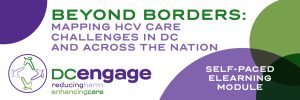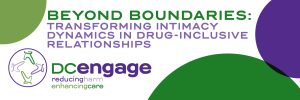Program: DC Engage
Opioid Overdose Prevention & Naloxone Education for Community
This module is intended for public use. By completing this module, learners will be able to utilize nasal naloxone to reverse a known overdose in emergency situations. Learners will understand how nasal naloxone reverses an overdose and will be able to summarize the epidemiology of opioid overdoses in the District of Columbia.

Beyond Borders: Mapping HCV Care Challenges in DC and Across the Nation
This module provides a comprehensive exploration of hepatitis C (HCV) transmission, prevention, and treatment. Participants will review demographics of high-risk populations, learn about the revolutionary impact of direct-acting antivirals (DAAs), and evaluate strategies for universal HCV testing in reducing transmission rates and improving public health outcomes.
Crossing The Threshold: Navigating The Gateway To SUD Treatment Spaces
This insightful webinar will guide you through the crucial steps in accessing substance use disorder (SUD) treatment spaces.

Beyond Boundaries: Transforming Intimacy Dynamics in Drug Inclusive Relationships
This webinar will provide participants with an overview of how to apply harm reduction principles for people who use drugs (PWUD) to the context of sexual health and relationships.
Bridging Care Outreach and Secondary Exchange
This webinar seamlessly combines theory and practice to empower participants with the essentials of outreach and secondary exchange.
Social Justice/Language Justice Implications for Services and Retention in Care
This group discussion focuses on social justice and retention in care.
Drug User Health in a Syndemic Environment – Strategies, Priorities, and Outcomes
These group discussions focus on drug user health in a syndemic environment.
Self Care Discussion with DC Engage Micro-Grantees
DC Engage’s annual Harm Reduction Conference brings together harm reductionists, community members, and experts to discuss the latest practices, techniques, and important issues in the harm reduction community.
Harnessing the Fury: Overcoming Barriers, Unveiling Pathways, and Minimizing Harm
Dive into a discourse centered on the policy limitations impeding the implementation of comprehensive HIV prevention programs for injection drug users. Uncover the pivotal role of policy change as a linchpin of public health action. Explore the transformative potential of research-driven insights and harm reduction approaches in minimizing the deleterious effects of HIV within this marginalized community.
All four 2023 Harm Reduction Conference training sessions must be taken to receive a total of 3.25 credit hours.
Drug User Health in a Syndemic Environment
This session addresses challenges related to living and accessing services in a syndemic environment. It covers those strategies that ensure individuals are able to address co-morbidities.
All four 2023 Harm Reduction Conference training sessions must be taken to receive a total of 3.25 credit hours.
